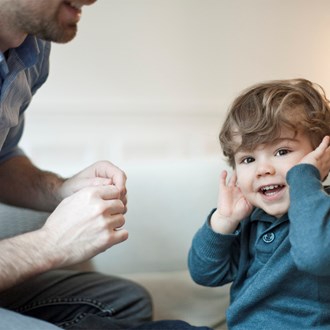You toddler's wacky behaviour explained

Are you living with a loony toddler? It’s not as unusual as you may think
By Practical Parenting
December 07 2016
So you decided to give your toddler a little independence. You briefly look away, only to realise your toddler is doing a nudie run in front of your in-laws. That’s on top of him laughing hysterically while peeing on the tree at daycare, rather than using the toilet. Then you remember that his older sister used to like licking the dog’s water bowl. Now you’re starting to wonder if you are breeding a couple of truly crazy kids.
In reality, your toddlers are most likely to be well-adjusted, imaginative and normal kids. It is typical toddler behaviour to sometimes act in what seems a really bizarre manner, such as trying the pet’s food, writing on the wall with their poo, or dressing in weird clothes. The exception to the rule is that if a toddler persists in a highly repetitive, fixated manner with unusual behaviour or if the behaviour persists past early toddler years.
Why do they act so strange?
It is understandable to question why your young toddler might do such silly things, like pouring dad’s cologne on, or painting with mum’s make-up. There are several answers to this perplexing question.
The first answer is based in cognitive development. Young toddlers live in their right brains, which is not only the non-verbal side of the brain, but also the more excitable, impulsive, experimental and non-emotional part of the brain. They spend less time in their left brain, which reasons more, controls impulses and is more verbal and rationally driven. In simple terms, young toddlers simply do it because it feels good, it’s fun and they enjoy it.
Young and mid-range toddlers don’t yet have the ability to have a social conscience. They actually only learn social conscience and appropriate behaviour, gradually and slowly, by being taught by adults. It’s also important to remember that many social norms are abstract cultural concepts that we have developed, such as it’s not polite to pick your nose and flick the dry snot, even though it logically works to rid your nose of annoying mucus.
Exploring their world
Before toddlers develop social conscience and social awareness, they are driven by natural curiosity, as well as a healthy thrill with discovering and experimenting.
Toddlers generally like reactions, be they good or bad. Unsurprisingly, toddlers delight in seeing that their wee makes drawings on trees, getting a giggling reaction when they do a nudie run, and seeing the reaction when they imitate the family pet.
This ‘imitation’ factor is another reason why toddlers do unusual things. Toddlers learn by imitating others around them. More curious and adventurous toddlers might lick the dog’s bowl as their dog does, or see what cat food tastes like, in the same way that they mimic and copy the worst things we say, or want to dress in mum or dad’s clothes.
Let them be wild
The good news is that you generally don’t need to panic, nor envisage a terrible, troubled future. Toddlers doing these crazy things does not indicate future deviance, disturbance or exhibitionism. Unless your toddler is fixated, obsessed or too repetitive in his strange behaviour, there is not a huge cause for concern.
Instead, try having a good laugh and sharing your experiences with family and friends. It’s healthy to accept that neither your toddler, nor you, are perfect, and that we all act a little weird and make mistakes sometimes. Sharing these stories with other well-adjusted parents is not only funny and healthy, but also reassures you that your toddler is normal.
As toddlers are developing and building a social conscience your aim should be to teach, not to discipline or punish. Toddlers generally don’t act wacky with malicious intent, therefore they don’t deserve discipline or punishment. What they do need is calm, consistent guidance and teaching as to what is acceptable and polite and what is not. Try to be firm and clear, but still empathetic, in guiding your toddler’s behaviour.
Try to remain calm
Be careful that you are not promoting their behaviour by laughing and giggling too much, just as you might be reinforcing these wild acts by overreacting in a negative manner. Try to be calm, slightly detached, but clearly instructive in teaching acceptable behaviour.
Also, try to recognise and give greater attention to good behaviour, such as thinking and being mindful of others. Finally, have a quiet laugh about it all and remember the crazy behaviour so that you can include it in your speech for his 21st birthday!






